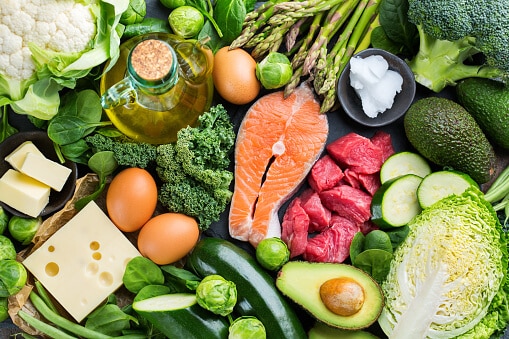
As we age, our dietary needs change
As we age, our dietary needs change, and it’s important to know how we need to alter our diets to promote senior nutrition. Exercising and staying active are important, but your diet plays a huge role in your overall health and wellness. Without a balanced diet for seniors, all the effort you put into reaching your fitness goals won’t go as far. Read these tips for senior nutrition to make sure you’re on track to have the best diet for seniors.
Cauliflower, kiwi, papaya and kale. These foods are rich in Vitamin C, which is an antioxidant. It promotes skin health by aiding in collagen production, which gives your skin elasticity. Antioxidants are said to prevent cancer and heart disease. Vitamin C also helps wounds heal faster and quickens the body’s ability to repair bones and teeth.
Fatty fish, egg yolks and fortified foods. These foods are high in Vitamin D, which aids in the absorption of calcium. Calcium and Vitamin D are the two most important vitamins necessary to prevent osteoporosis. We get Vitamin D from sun exposure, but too much sun exposure can also damage the skin. We actually need very little sun exposure to fulfill our Vitamin D needs, and we can also get Vitamin D from food. It protects against chronic conditions like multiple sclerosis, type 2 diabetes and cancer.
Meat, poultry and dairy. These foods contain B12, which maintains nerve function and the production of red blood cells.
Soybeans, flaxseed, canola oil and walnuts. These foods are high in Omega-3 fatty acids, which help prevent inflammation, reducing the risk of cancer, rheumatoid arthritis and heart disease, common senior health problems. Consuming these fatty acids regularly keeps the brain healthy and alert, combating dementia. Two servings a week should do the trick.
Dairy (milk, yogurt, cheese), leafy greens, seafood, legumes, dried fruit and tofu. These foods are rich in calcium, which helps build strong bones, helps your blood clot, and helps muscles, like your heart, contract. If you have a calcium deficiency, your body will begin to pull from the existing calcium in your bones, which weakens them and leads to osteoporosis and makes you more prone to injuries like a broken hip. Aim for about four cups of milk (can be soy or almond) or orange juice, or the equivalent in daily servings of food.
Bananas, avocados and potatoes. These foods have lots of potassium, which promotes kidney health by aiding in cell function and reducing blood pressure.
Nuts, whole grains, brown rice, fruits and vegetables. These foods are rich in fiber, which aids in digestion. As we age, the gastrointestinal walls thicken, slowing the digestive process and making us more prone to constipation. Fiber also helps slow the body’s absorption of sugar, preventing spikes after meals, which seniors can be prone to.
Blueberries. These are one of the best anti-aging foods because they’re packed with antioxidants, which flush the system of toxins and protect the body against ”oxidative stress,” which causes aging.
Dark leafy greens, tofu and dark chocolate. These foods are high in iron, which produces hemoglobin. Hemoglobin carries oxygen from the lungs to the rest of the body. If you have an iron deficiency, your organs and tissues are not receiving enough oxygen, which can result in anemia, tiredness and lethargy.
Whole grains, nuts, fruits and vegetables. These foods have a lot of magnesium, which keeps your heart healthy, your bones strong, and your immune system stable. You’ll need five portions a day to keep your heart healthy. Some medications for older people can cause magnesium deficiency, so it’s important to keep this up.
Tomatoes. They’re high in lycopene, which is a natural chemical that can protect against prostate cancer and lung cancer. Heating tomatoes can release more lycopene, so try eating them cooked.
Water. Don’t forget about this vital nutrient. Drinking a lot of water is one of the most important parts of staying healthy. Staying hydrated aids in most all bodily processes, from regulating body temperature to running the digestive system smoothly to keeping the skin youthful. Eight 8-ounce glasses per day is a good rule of thumb, but it does depend on your age, weight, gender and activity level — you can use an online calculator to help you determine exactly how many ounces you need per day, but it’s hard to drink too much water, so the more you can chug, the better.
Red wine. You heard us. In moderation, it’s been said to lower bad cholesterol, prevent blood clots and lower blood pressure. A glass in the evening won’t hurt and may even do some good.
There are supplements available to make up for a deficiency of any of these vitamins and nutrients to create a more balanced diet for seniors. Always consult with your doctor before changing your diet drastically or adding supplements into the mix.
Eating right is one vital step to promoting senior health and staying able to remain active well into your retirement. When you combine a healthy diet with all the engaging wellness activities Hamlet has to offer, like participating in a group exercise class, working in our community garden, or strolling through our 47-acre campus, you have everything you need here to prioritize your health.

